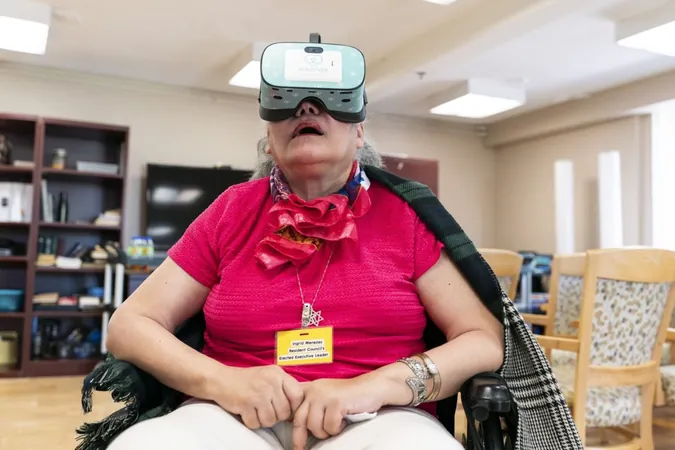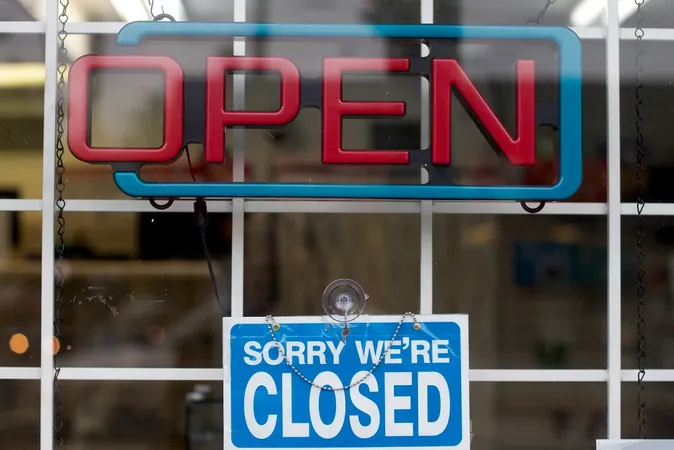
Virtual Safaris and Cockpits: How Seniors in Long-Term Care Are Finding New Joy Through VR
2024-12-18
Author: William
Virtual Safaris and Cockpits
TORONTO — Imagine sitting in a cozy long-term care home while virtually roaming the breathtaking African savannah. This has become a reality for many seniors, thanks to the innovative use of virtual reality (VR).
In a recent session at Kennedy Lodge in East Toronto, 71-year-old Ingrid Menezes eagerly interacted with virtual wildlife. "Come on zebra, come!" she exclaimed, reaching out as the recreation assistant, Dorothy Laugo, guided her through the experience using a tablet.
As Menezes engaged with the virtual environment, she spotted a rhinoceros and gasped with delight at the sight of a giraffe, demonstrating VR's ability to spark joy and memories among seniors. After her journey through the African wilderness, Menezes returned to the real world with a bright smile, showcasing the immersion that VR provides.
Enhancing Quality of Life
More than just entertainment, VR offers companionship and connection for residents, particularly those grappling with dementia. According to the Canadian Association for Long Term Care, incorporating technology like VR enhances the quality of life for seniors, making it a vital tool for caretakers. "Looking ahead to 2025, the focus is on rapidly integrating technology into long-term care settings," stated Jodi Hall, CEO of the association.
Tailored Experiences
The unique benefit of VR lies in its adaptability. Staff at Kennedy Lodge tailor experiences based on each resident's interests and needs. "You can’t just put a headset on a resident and choose for them," emphasized Sandra Morgan, the program manager. Lists of resident preferences help caregivers design programs that resonate with individuals, ensuring a positive experience for everyone involved.
Family participation is also encouraged. Morgan often reminds family members to engage with their loved ones during VR sessions, creating shared experiences that bridge generational gaps. "We’re going to interact with Grandma during this visit," she tells visitors, highlighting that VR can also ignite enthusiasm in younger relatives.
Social Interaction and Calming Environments
For those with higher cognitive functions, group VR sessions offer a chance for social interaction and shared experiences. In contrast, residents with dementia may benefit from one-on-one sessions that provide calming environments to help alleviate anxiety. "Nature, beaches, and soothing visuals are favorites," Laugo noted.
Reconnecting with Memories
Baycrest Centre, a renowned teaching and research facility in Toronto, employs VR to help seniors reconnect with cherished memories. One resident, a former scuba diver, found immense joy while virtually exploring underwater worlds, cherishing the moment by reminiscing with family members.
Moreover, Baycrest is researching whether VR can reduce "responsive behaviors" associated with dementia. Initial results from pilot studies have been promising, reinforcing the importance of tailored experiences for effective therapy.
Powerful Personal Connections
One poignant example involved a resident who was a pilot. When placed in the virtual cockpit of a Cessna, he instinctively reached for the controls, reflecting the powerful connection between VR and personal history. "There were smiles all around after his session," said principal investigator Mara Swartz.
Transforming Long-Term Care
The programs at both Kennedy Lodge and Baycrest are powered by Rendever, a Boston-based company that specializes in VR for healthcare. With over 150 clients across Canada, Rendever is transforming the landscape of long-term care. They enable virtual trips to meaningful places from seniors' pasts, unlocking buried memories by using Google Maps and personal photos.
David Stoller, Rendever’s vice-president, explained the capability to revisit significant life moments—whether it be a childhood home or a much-loved restaurant. "We're able to bring people back to those positive emotions," he remarked, highlighting the potential of VR to refresh and uplift the spirits of seniors.
The Future of Elder Care
As technology continues to advance, VR is poised to play a crucial role in reshaping how we care for our elderly populations, bridging the gap between past and present, and fostering connections that can transcend the confines of physical limitations.
This is not just about entertainment; it’s about creating new memories, fostering relationships, and above all, enhancing the quality of life for seniors in a way that was once thought impossible.
Stay tuned as we explore more groundbreaking ways technology is changing the narrative for our aging community in the coming months!









 Brasil (PT)
Brasil (PT)
 Canada (EN)
Canada (EN)
 Chile (ES)
Chile (ES)
 España (ES)
España (ES)
 France (FR)
France (FR)
 Hong Kong (EN)
Hong Kong (EN)
 Italia (IT)
Italia (IT)
 日本 (JA)
日本 (JA)
 Magyarország (HU)
Magyarország (HU)
 Norge (NO)
Norge (NO)
 Polska (PL)
Polska (PL)
 Schweiz (DE)
Schweiz (DE)
 Singapore (EN)
Singapore (EN)
 Sverige (SV)
Sverige (SV)
 Suomi (FI)
Suomi (FI)
 Türkiye (TR)
Türkiye (TR)